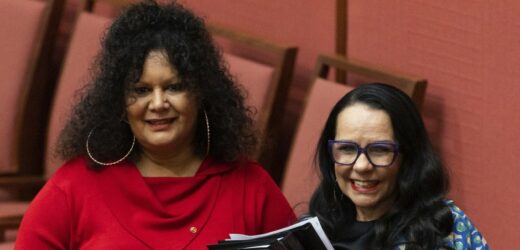Save articles for later
Add articles to your saved list and come back to them any time.
The Yes and No camps will ramp up their campaigns on the Voice to parliament after the referendum bill to authorise the national vote passed the Senate on Monday morning, 52 votes to 19.
The bill cleared the parliament after many hours of debate in both chambers, meaning the referendum must now be held within two to six months.
Assistant Minister for Indigenous Australians Malarndirri McCarthy and Minister for Indigenous Australians Linda Burney enter the Senate at Parliament House in Canberra on Monday.Credit: Alex Ellinghausen
Prime Minister Anthony Albanese is yet to announce the date the referendum will be held, but October 14 is among the preferred dates being weighed up by the government.
The bill’s passage through the Senate bookends an emotive debate in the parliament, which included controversial remarks by Opposition Leader Peter Dutton’s claim the Voice would “re-racialise” country and make Indigenous Australians more equal than non-Indigenous Australians.
Speaking ahead of the bill’s passage on Monday morning, Indigenous Australians Minister Linda Burney said a Yes vote would result in “real practical improvements” for Indigenous Australians.
“It means giving people a say, acknowledging in our Constitution 65,000 years [of history], it is about the pride of being Australian, and it’s also a history-making exercise,” Burney told ABC Radio National.
“There’s not very many chances we get to lean into history and give it a bit of a push.”
The public gallery was packed with visitors as senators from across the political spectrum gave their final reflections on the debate before the vote.
Other figures present for the historic Senate debate included Indigenous academic Marcia Langton, Indigenous Affairs Minister Linda Burney, Attorney-General Mark Dreyfus, Climate Change and Energy Minister Chris Bowen, NT Labor MP Marion Scrymgour and Nationals MP Barnaby Joyce.
CLP senator and leading No campaigner Jacinta Nampijinpa Price denounced the Voice as a “dangerous and costly” proposal and said the government had failed to explain how the body would work.
“We are being divided. We will be further divided throughout this campaign. And if the Yes vote is successful, we will be divided forever,” Price, the opposition’s Indigenous Australians spokeswoman, said.
NT Indigenous Labor senator Malarndirri McCarthy said Australians were on the cusp of a critical moment in the nation’s history and urged both Yes and No supporters to “listen to the better sides of yourself” and ensure the public debate over the coming months remained respectful.
“It’s important that we are able to pursue this as a country in dignity with respect for one another,” she said.
Indigenous independent senator Lidia Thorpe, a longtime critic of the Voice who had previously foreshadowed she would abstain from the Senate vote, told the chamber the proposal was about “appeasing the white guilt in this country” as she declared she would vote No.
“Gammin, as we know, is fake. Pretend. A joke. And that’s what I think a powerless Voice is,“the Victorian senator said.
Senator Lidia Thorpe during debate in the Senate on Monday.Credit: Alex Ellinghausen
Thorpe wore a tshirt emblazoned with “gammin” as she spoke, partly covered by a jacket after being instructed to cover it by the Senate president Sue Lines in order to comply with the chamber’s ‘no-slogan’ rule.
“I’ll be voting no to this disastrous idea of giving us no power,” she said, adding: “Happy assimilation day everybody”.
Thorpe repeatedly interjected as Indigenous Greens senator Dorinda Cox explained why she was voting Yes, including saying “prove it” when Cox said the bill would not result in Indigenous peoples’ sovereignty being ceded.
“This change to the Constitution does not impact our sovereignty, my sovereignty, and I would not be standing up here in support of this bill if I had any doubt in my mind that it would,” Cox said.
Voice architect Megan Davis, Cobble Cobble woman and UNSW constitutional law professor, said the bill’s passage through the Senate was “an historic moment”.
“We’re closer to a referendum to finally give First Nations Peoples a chance to be
heard,” Davis said.
“This is the recognition we’ve been fighting for and what the vast majority of First Nations People support. The significance of this moment cannot be overstated.”
Cut through the noise of federal politics with news, views and expert analysis from Jacqueline Maley. Subscribers can sign up to our weekly Inside Politics newsletter here.
Most Viewed in Politics
From our partners
Source: Read Full Article




